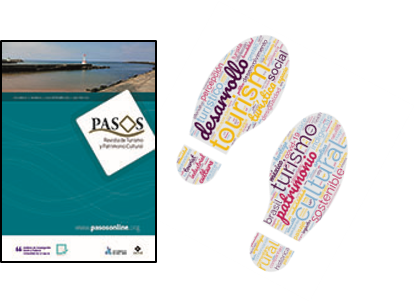The reflection of "the typical". The construction of touristic products in Chaco (Argentina)
DOI:
https://doi.org/10.25145/j.pasos.2023.21.043Keywords:
Tourism, Chaco, Ethnography, State, NGOAbstract
Using the notion of fetishism, we analyse the construction of Chaco touristic products, delving into the social relations that are made invisible appearing in the physical shape of objects with value. We continue research initiated in 2012 and 2019 (referring to processes of commodification of Chaco indigenous handicrafts and culture in tourist-cultural projects). We use the ethnographic method, covering ethnographic interview and reviews of official documents and websites. The construction of the products in question, by tour operators, state agents and non-governmental organizations, involves an administration of perceptions that articulate reality and fiction. The fiction of “the typical” as something that is there to be shown is linked to products presented as the same after through operations of selection, naming, hierarchisation, demonstration, translation and certification. These operations, however, remain unfocused, thus promoting the sense of "the typical" as something that is there.
Downloads
Publication Facts
Reviewer profiles N/A
Author statements
- Academic society
- PASOS. Revista de Turismo y Patrimonio Cultural
- Publisher
- Instituto Universitario de Investigación Social y Turismo. Universidad de La Laguna (España) - Instituto Universitario da Maia ISMAI (Portugal)
References
Barrios, M. G. 2016. Sabores del Chaco: antecedentes históricos y culturales de la gastronomía chaqueña. Instituto de Turismo del Chaco.
Bayardo, R. 2005. Museos: entre identidades cristalizadas y mercados transnacionales. Anais do Museu Paulista 13(2), 257‑274.
Bendahan O. N., Carluci de Bertollo, M. A., Doro, R., Sarmenti, L., Varin, A., Bajlec, J. (1977). Manual sobre artesanías regionales argentinas. Consejo Federal de Inversiones.
Benedetti, C. 2014. La diversidad como recurso. Producción artesanal chané destinada a la comercialización e identidad. Antropofagia.
Cardini, L. A. 2017. El trabajo de los Qom: artesanías, cultura y construcción política en Rosario. Prohistoria Ediciones.
Carenzo, S. 2011. Desfetichizar para producir valor, refetichizar para producir el colectivo: cultura material en una cooperativa de “cartoneros” del Gran Buenos Aires. Horizontes Antropológicos 17(36), 15‑42.
Gómez, S. 2013. Pueblos originarios y turismo en la provincia del Chaco: construcción de “lo indígena” y mercantilización de la cultura. Cuadernos de Antropología 9, 105‑125.
Graeber, D. 2005. Fetishism as social creativity or, Fetishes are gods in the process of construction. Anthropological Theory, 5(4), 407–438.
Graeber, D. 2018. Hacia una teoría antropológica del valor: la moneda falsa de nuestros sueños. Fondo de Cultura Económica.
Greru, C. y Kalkreuter, B. 2017. Design and the Evolving Tradition of Sanganer Hand Block Printing: Formation and Negotiation of Artisanal Knowledge and Identities Against the Backdrop of Intangible Cultural Heritage. The Journal of Modern Craft, 10(2),137‑156.
Kawlra, A. 2014. Duplicating the Local: GI and the Politics of ‘Place’ in Kanchipuram. NMML Occasional Paper Perspectives in Indian Development (New Series 29).
Lacarrieu, M. 2016. La alteridad y el exotismo en clave patrimonial turística. Aportaciones de la Antropología. Quaderns, 32, 123‑143.
Marx, K. 2015. La mercancía. In El capital: El proceso de producción del capital. Tomo I/ Vol. 1. Libro primero (pp. 43‑102). Siglo Veintiuno Editores.
Master Plan El Impenetrable (2017). Plan Integral de Desarrollo Turístico y Gestión Sostenible en El Impenetrable. Gobierno de la provincia de Chaco.
Prats, L. 2000. El concepto de patrimonio cultural. Cuadernos de Antropologia Social, 11, 115‑136.
Prats, L. 2006. La mercantilización del patrimonio: entre la economía turística y las representaciones identitarias. Boletín del Instituto Andaluz del Patrimonio Histórico, 58, 72‑80.
Quevedo, C. y Giordano, M. 2021. La producción turística del Impenetrable chaqueño: avanzadas capitalistas, naturaleza y territorio. Revista Colombiana de Sociología, 44(2), 189‑215.
Santana Talavera, A. 2003a. Turismo cultural, culturas turísticas. Horizontes Antropológicos, 9(20), 31‑57.
Santana Talavera, A. 2003b. Patrimonios culturales y turistas: Unos leen lo que otros miran. PASOS. Revista de Turismo y Patrimonio Cultural, 1(1), 1‑12.
Torres Fernández, P. 2008. Redefiniendo alteridades. Políticas provinciales de turismo étnico en Chaco y Formosa. IX Congreso Argentino de Antropología Social. Facultad de Humanidades y Ciencias Sociales. Universidad Nacional de Misiones, Posadas.
Torres Fernández, P. 2010. La transformación de “lo étnico” en producto turístico en la provincia de Chaco, Argentina. RUNA, 31(1), 89‑107.
Ulloa, A. 2001. El nativo ecológico: movimientos indígenas y medio ambiente en Colombia. In M. Archila y M. Pardo (Eds.), Movimientos sociales, Estado y democracia en Colombia (pp. 286‑320). Universidad Nacional de Colombia. Facultad de Ciencias Humanas. Centro de Estudios Sociales. Instituto Colombiano de Antropología e Historia
Ulloa, A. 2004. La iconografía ambiental: imágenes y representaciones del nativo ecológico. In La construcción del nativo ecológico. Complejidades, paradojas y dilemas entre los movimientos indígenas y el ambientalismo en Colombia (pp. 255‑320). Instituto Colombiano de Antropología e Historia.
Downloads
Published
How to Cite
Issue
Section
License
Copyright (c) 2022 Myriam Fernanda Perret

This work is licensed under a Creative Commons Attribution-NonCommercial-NoDerivatives 4.0 International License.
I confirm that the work is original (of my/our authorship), and that it will not be submitted to other journals or publications until the final resolution of the review process in PASOS, RTPC.
I authorize the publication of my work by PASOS, PSTN of free and open access in any of the formats that I deem appropriate, for an indefinite period of time and as a non-remunerated collaboration.
Likewise, the author(s) understands that the published work may be linked or deposited on any server or included in other publications (republication), provided that the new place and/or new edition references the original publication and acknowledges the authorship and copyright ownership of PASOS RTPC publications.
Authors understand that a plagiarism-self-plagiarism check will be performed, and the article may be removed at any time from the editorial flow.










